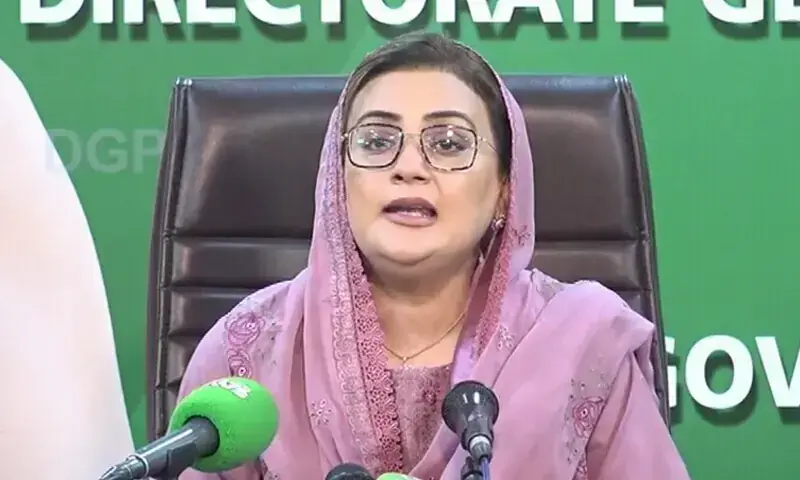Listen to the article
In a firm rebuttal to mounting criticism, Punjab Information Minister Azma Bokhari dismissed allegations on Sunday regarding restrictions on wheat movement between provinces, calling such claims “baseless and contrary to facts.”
Her statement, reported by state-run APP news agency, comes amid escalating tensions as both Khyber Pakhtunkhwa and Sindh provincial governments have accused Punjab of restricting critical wheat supplies.
The controversy intensified after the KP government sent a formal letter dated October 23 to Punjab authorities, demanding the withdrawal of what they described as restrictions on inter-provincial movement of wheat and flour. The KP administration warned that these alleged curbs were disrupting supply chains, driving up prices, and threatening food security across their province.
Simultaneously, Pakistan People’s Party leadership in Sindh voiced sharp criticism against the Punjab government, specifically accusing it of limiting wheat seed supplies to their region.
Bokhari firmly rejected these allegations, explaining that inter-provincial flour transportation continues “transparently through official permits,” which she said ensures “a clear and traceable record of all consignments being transported out of the province.”
In a pointed critique of the KP administration, the Punjab minister suggested that if KP’s flour demand exceeds its production capacity, its government should either release wheat from its own storage facilities or procure supplies from the Pakistan Agriculture Storage and Services Corporation (Passco). “Punjab cannot compromise the right of its people to affordable flour for the sake of another party’s political theatrics,” she asserted.
The minister further claimed that over 200 flour mills in KP currently sit idle. She advised the province’s chief executive to “focus on reviving these mills instead of staging protests outside Adiala Jail” – an apparent reference to KP Chief Minister Sohail Afridi’s recent sit-in outside the prison where Pakistan Tehreek-e-Insaf founder Imran Khan remains incarcerated.
The dispute occurs against a backdrop of policy uncertainty regarding wheat management in Pakistan. In May, the federal food minister had informed the National Assembly that Passco was slated for abolition – a policy later reversed under a national wheat policy, though procurement procedures remain contested. This national policy had stipulated there would be no restrictions on wheat movement between provinces.
Addressing constitutional frameworks, Bokhari emphasized that permits and digital monitoring have been implemented as mandatory measures to prevent hoarding and profiteering, in accordance with Article 18 of the Constitution and relevant legislation, rather than to restrict movement.
She underscored that the welfare of Punjab’s citizens remains her government’s top priority, with efforts focused on ensuring “availability and affordability of flour for every citizen.” The minister suggested that this “pro-people style of governance is what some elements find hard to digest.”
Highlighting Punjab’s preparedness, Bokhari revealed that the provincial government currently maintains wheat reserves of 0.885 million metric tons, valued at approximately Rs100 billion, which she attributed to the “farsighted and organised policies” of Punjab Chief Minister Maryam Nawaz.
To maintain market stability, Bokhari noted that flour mills receive wheat supplies at Rs3,000 per maund (40 kilograms), aimed at ensuring consistent availability and stable prices for consumers.
The dispute underscores ongoing challenges in Pakistan’s agricultural sector, where inter-provincial tensions over essential commodities often emerge during shortage periods, complicated by political rivalries and governance issues across the country’s federal structure.
Verify This Yourself
Use these professional tools to fact-check and investigate claims independently
Reverse Image Search
Check if this image has been used elsewhere or in different contexts
Ask Our AI About This Claim
Get instant answers with web-powered AI analysis
Related Fact-Checks
See what other fact-checkers have said about similar claims
Want More Verification Tools?
Access our full suite of professional disinformation monitoring and investigation tools




8 Comments
The claims and counterclaims around wheat transport restrictions highlight the complexities involved in managing food supply chains. A collaborative, fact-based approach by the provincial governments is essential to maintain stable food prices and availability.
This dispute over wheat movement highlights the complex dynamics of resource allocation and distribution across Pakistan’s provinces. A collaborative, evidence-based approach is crucial to find a fair and effective solution.
The provincial governments’ handling of the wheat supply situation will have a significant impact on food prices and availability for the common people. I hope they can put politics aside and prioritize the needs of the citizens.
Wheat supplies and pricing are critical issues, especially during times of economic hardship. I hope the provincial authorities can work together constructively to find a solution that addresses the concerns of all stakeholders.
While the Punjab government’s stance is clear, the concerns raised by other provinces deserve a thorough and impartial investigation. Maintaining transparent and efficient wheat supply chains is essential for food security.
Interesting development in the wheat supply situation across Pakistan. The provincial tensions over restrictions on wheat movement need to be resolved transparently and equitably to ensure food security for all citizens.
This dispute over wheat movement restrictions is an important issue that goes beyond just political posturing. Ensuring reliable and affordable food supplies for all Pakistanis should be the top priority for the provincial authorities.
While the Punjab government denies the allegations, the concerns raised by Khyber Pakhtunkhwa and Sindh provinces regarding wheat shortages and price hikes deserve a thorough investigation. Transparent and equitable resolution of this issue is crucial.